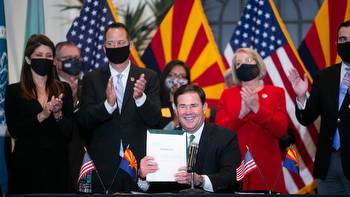Tribe argues against off-reservation gambling

PHOENIX— The question of whether Arizonans can start laying down bets beginning Thursday for or against the Cardinals -- or any other professional or collegiate team -- turns on whether a judge decides that legislation approving off-reservation gambling was legally enacted.
And the judge made it clear Monday he is skeptical of the key legal objections to the plan being raised by the Yavapai-Prescott Indian Tribe.
During the hearing, Nicole Simmons, representing the tribe, acknowledged that the state is free to allow wagering on professional and collegiate events to occur at off-reservation venues and mobile devices, something not now permitted.
“But it has to be lawful,” she told Maricopa County Superior Court Judge James Smith.
What that means, Simmons argued, is sending the question to voters for their ratification.
That's because they were the ones who adopted Proposition 202 — a 2002 law that spelled out that most forms of gambling were limited to reservations. The only exceptions were for gaming already allowed like horse racing and the lottery.
And the Arizona Constitution says the only way lawmakers can alter what voters have adopted is if it “furthers the purpose” of the original law.
Only thing is, the legislature earlier this year approved -- and Gov. Doug Ducey signed -- HB 2772 that, as of this coming Thursday, is designed to permit Arizonans to lay down bets not just on the outcome of events but even make specific “prop bets” on things like yardage per game or even the number of times a specific player will strike out.
And with the aid of technology, that can occur live, even as the event is unfolding.
Simmons contends that taking away the exclusive right of tribes to conduct certain kinds of gaming cannot possibly further the original intent of Proposition 202. And what that means, she told the judge, is that none of this is legal until lawmakers get voter OK to change the original 2002 law.
But Smith said there's a problem with that.
He pointed out there is what has become known as a “poison pill” in that original agreement.
It says that if the state violates the gaming exclusivity of any tribe, it is free to operate as many gaming devices as it wants. Now the Yavapai-Prescott Indian Tribe has a current limit of 936.
That verbiage also would allow the tribe to can operate as many types of table games as it wants.
And it would sharply reduce the amount of revenue the tribe is required to share with the state.
“With that language, how can I conclude that Prop 202 meant to be some sort of perpetual limit on in Arizona?” Smith asked.
Simmons remained adamant.
Smith promised a ruling no later than Tuesday. That will give the side that loses a chance to file an immediate appeal.
Under HB 2772, beginning Thursday both tribes that sign new gaming compacts with the state as well as various sports franchises can accept sports bets. Most tribes have agreed to the deal which also includes their ability to offer new forms of gambling not now allowed like roulette and craps, beyond the slot machines, blackjack and poker.
It is that off-reservation wagering provision that Simmons and her client hope to void. Legal issues aside, Simmons said the deal offered to the Yavapai-Prescott Indian Tribe would actually cause it financial harm, not only because of expanded off-reservation gaming but her contention that better deals were offered to other tribes.
But Patrick Irvine, who represents state Gaming Director Ted Vogt told Smith there's an even greater financial harm to the state which stands to share in all that sports wagering.
More to the point, he said the lawsuit comes months after the measure was approved, after the licenses were granted and the companies that have paired with the sports franchises to operate the gaming have invested a lot of money.
“If you listen to the radio when you drive, you've probably heard advertisements for them,” Irvine said. Any delay, he said, will cost the state “in the millions per month, really starting from this week.”
That is a crucial legal point: In deciding whether to enjoin the new gambling operations, Smith has to decide the balance of hardships and who is likely to suffer irreparable harm.
Still, the judge had questions about exactly what Ducey negotiated and what lawmakers approved.
Of particular note is that there are 20 licenses to take sports wagers, half to tribes that were selected by the Gaming Department and half to sports franchises, of which there are fewer than 10. So the Cardinals automatically got one, as did the Diamonbacks, the Coyotes, the Phoenix Mercury and even the Professional Golfers Association tour and NASCAR racing.
Smith wondered why wagering had to be tied to those particular events.
“You couldn't be tied to a different type of professional sporting event as a venue?” he asked.
Anni Foster, the governor's chief legal counsel, conceded that's the way it is now. For example, she said that Turf Paradise, which operates horse racing in Arizona, has been denied the ability to take wagers on other professional sports because it “wasn't necessarily delineated specifically in the statute as an option.”
But Foster insisted that the statute does anticipate other kinds of sports teams being able to apply and potentially get wagering rights.
“We don't know what that would necessarily be in the future,” she said.
“Is that professional fighters, like MMA?” Foster said, referring to mixed martial arts. “Or is that other drag-racing types of things?”
That decision, she said, rests with the Department of Gaming.
Smith, however, isn't the only one who has raised the question of whether Ducey crafted a special favor for certain team owners.
During debate on the measure, Sen. Michelle Ugenti-Rita, R-Scottsdale, complained the only people eligible to get a license to take off-reservation wagers on sporting events are the owners of the existing sports franchises.
“We are going to reward people with monopolies with more monopolies,” she complained. She asked that the process be opened up so anyone can bid to operate one of the 10 off-reservation gaming operations.
But her colleagues agreed to accept the deal as Ducey negotiated it with the teams and the tribes and then presented it to lawmakers as a take-it-or-leave it package.
Foster also argued that the new gaming laws do further the purpose of the original 2002 law because it still limits the amount and kind of gambling that can occur and keeps in place state regulation. And she said the arguments by the tribe amount to little more than “smoke and mirrors to support their allegations that the bill is unconstitutional.”























